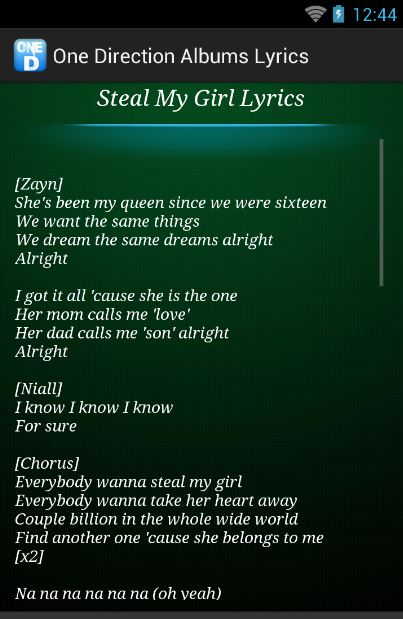
- Youtube one direction steal my girl lyrics movie#
- Youtube one direction steal my girl lyrics license#
The final line of the third verse of “Hine-i-te-Awatea” refers to the Maori idioms “paki o Hewa” and “paki o Ruhi,” which both mean fine weather, referencing the deities Hewa and Ruhi - “paki o Ruhi” is associated specifically with summer. “It refers to an understanding that people and environment are interconnected and dependent on each other’s care to thrive.” “There’s a really beautiful concept in te ao Maori, that of kaitiakitanga,” Lorde wrote.
Youtube one direction steal my girl lyrics license#
When the lyrics were getting checked, she found out she’d been using the literal translation for death instead of the personified word - Maori is a very metaphorical language associated with a worldview that is more connected with nature, and doesn’t necessarily follow Western assumptions.Īn example of its nuance can be found in Lorde’s “Hine-i-te-Awatea,” or “Oceanic Feeling.” Hana Mereraiha, who translated it, said she was granted creative license for the three songs she worked on the album “Solar Power,” with its dedication to the sun and everything living under it, was quite Maori in spirit already.

“It was kind of spooky - it was about talking to death,” she said. Runga has tried writing a song in Maori, although it’s not as simple as translating the text directly.
Youtube one direction steal my girl lyrics movie#
Mohi’s idea to bring attention to the language via contemporary music was pragmatic: More than half of the Maori population, which make up nearly 17 percent of the total population, is under 30 years old.īic Runga, a Maori singer involved in both “Waiata/Anthems” releases, said, “There’s a really big shift in awareness here.” She was in the process of reconnecting with her roots when Mohi approached her for the first album, which included her song “Sway,” made famous by the movie “American Pie.” Though Runga had only absorbed little bits of Maori in elementary school, as a result of doing “Waiata/Anthems,” she’s been connected to more fluent speakers and is trying to incorporate Maori into her emails, like opening with “tena koe” instead of “hi.” Kotahi Rau Pukapuka, an endeavor that aims to publish 100 books in Maori over the next 25 years, is already far ahead of schedule. Newscasters now greet in Maori weather reporters call places by their original, Maori names supermarket signs tell you where the “chicken/heihei” is. In recent years, there has been a resurgence of supporters, including Prime Minister Jacinda Ardern, who said in 2018 that her newborn daughter would learn both Maori and English.

By 1987, when Maori was finally declared an official language, the vast majority of its remaining speakers were older. The country’s European settler government suppressed Maori beginning in the mid-1850s, punishing children who spoke their language at school and deliberately dispersing Maori families in white neighborhoods to assimilate them, creating far-reaching whakama, or shame, around it. Awareness and celebration of Maori music is mirroring a shift in attitudes toward the language across New Zealand.


 0 kommentar(er)
0 kommentar(er)
